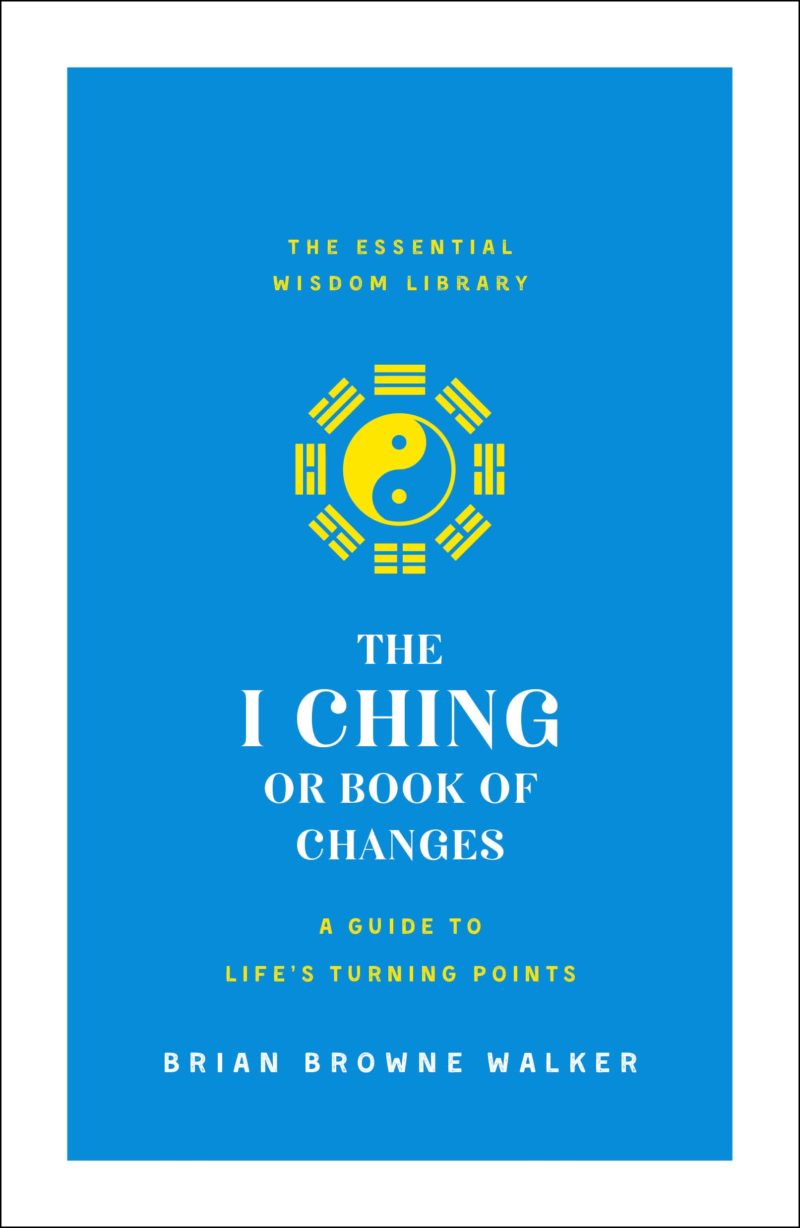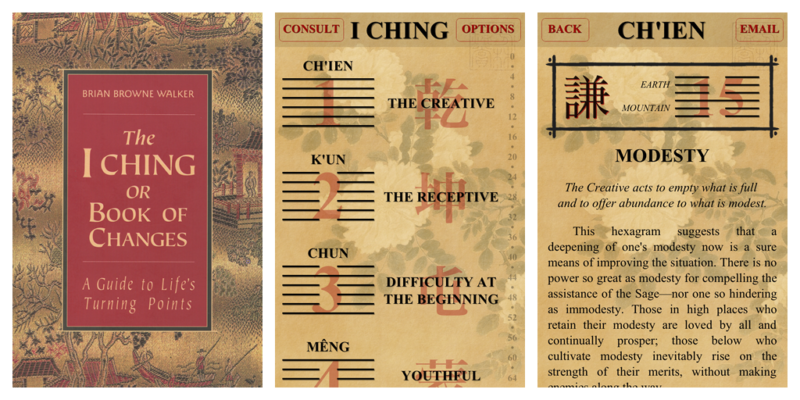

Click here to see the #1-ranked I Ching app in the world
On its surface, the I Ching is merely a book. It is a very old book — one that has survived for thousands and thousands of years in many different forms — but it is just a book. It is also a very wise book — it is regarded as the foundation text of Chinese wisdom and philosophy, and was instrumental to sages such as Confucius, whose education and teachings were formed by it — but it is just a book.
Beneath the surface, however, the Book of Changes is more than just a book. It is a living, breathing oracle, a patient and all-seeing teacher, an always-open spiritual school which can be relied upon for flawless counsel at every point in our lives. Those who approach the I Ching sincerely, consult it regularly, and embody in their lives the lessons it teaches inevitably experience the greatest riches that life has to offer: discernment, contentment, peace of mind.
The Book of Changes speaks to us not in abstract platitudes but with direct advice about what to do now, in this situation, to bring about our own success and good fortune. It is for this reason that it is so dynamically alive today, thousands of years and thousands of miles from its place of origin.
The I Ching, or Book of Changes
Hexagram 13 / Fellowship with Others

This hexagram addresses the proper basis for relationships with others. It generally comes as a sign that some kind of self-correction is in order in this arena.
Proper relationships, whether in love, work, family, or friendship, must be founded on and conducted under proper principles in order to succeed. Our model for how to behave with others is the Sage: in relating we are obliged to practice kindness, humility, correctness, equanimity, and openness. Wherever we depart from these we lose the aid of the Higher Power and risk and encounter with misfortune.
The fundamental rule of the I Ching for the conduct of relationships is that they take place in the open. This means that every facet of a relationship should be seen as fair and correct by everyone concerned, not just yourself. It also means that it is improper to enter into or continue in relationships with unspoken reservations or hidden intentions.
Exceptional things can be accomplished by those who come together correctly in fellowship now under the guidance of an enlightened leader or leaders. Seek that role by patterning yourself after the Sage. Meet others halfway in a spirit of sincerity and receptivity. Give trust where it is due; where it is not, do not resort to harshness – reserve and reticence are adequate measures. Avoid the formation of factions and cliques, and correct your errors in relationships as soon as you become aware of them. In this way you can accomplish magnificent deeds now.
The I Ching, or Book of Changes
Hexagram 13 / Fellowship with Others
ebooks & apps of the Tao the Ching, I Ching,
Hua hu Ching, and Art of War for
You
can now buy
the I Ching as part of a
five-app bundle of Taoist classics
for iPhone or iPad for less than
the cost of one hardcover
book.

Pingback: Brian Browne Walker
Pingback: Hexagram 3: Chun / Difficulty at the Beginning « Brian Browne Walker
Pingback: Hexagram 33, Tun / Retreat « Brian Browne Walker
Pingback: The I Ching, or Book of Changes: Hexagram 28, Ta Chu / The Taming Power of the Great « Brian Browne Walker
Pingback: Hexagram 32: Heng / Duration: “Remain steady and allow the world to shape itself.” « Brian Browne Walker
Pingback: Mom in LA City » Resolutions and resolve
Pingback: The I Ching, or Book of Changes: Chapter 11, T’ai / Peace « Brian Browne Walker
Pingback: The I Ching, or Book of Changes: Hexagram 56, Lu / The Wanderer « Brian Browne Walker
Pingback: The I Ching, or Book of Changes: Chapter 23, Po / Splitting Apart « Brian Browne Walker
Pingback: The I Ching, or Book of Changes: A Guide to Life’s Turning Points: Hexagram 11, T’ai / Peace « Brian Browne Walker
Pingback: The I Ching, or Book of Changes: A Guide to Life’s Turning Points: Hexagram 43, Kuai / Breakthrough / Resolution « Brian Browne Walker
Pingback: The I Ching, or Book of Changes: Hexagram 60, Chieh / Limitation « Brian Browne Walker
Pingback: The I Ching, or Book of Changes: A Guide to Life’s Turning Points: Hexagram 15: Ch’ien / Modesty « Brian Browne Walker
Pingback: The I Ching, or Book of Changes: A Guide to Life’s Turning Points: Hexagram 40: Hsieh / Deliverance « Brian Browne Walker
Pingback: The I Ching, or Book of Changes: A Guide to Life’s Turning Points: Hexagram 5, Waiting / Nourishment « Brian Browne Walker
Pingback: The Tao te Ching of Lao Tzu, Chapter 14 « Brian Browne Walker
Pingback: The I Ching, or Book of Changes: Hexagram 9, Hsiao Ch’u / The Taming Power of the Small « Brian Browne Walker
Pingback: The I Ching, or Book of Changes: Chapter 31, Hsien / Influence (Wooing) « Brian Browne Walker
Pingback: The Tao te Ching of Lao Tzu, Chapter 13 « Brian Browne Walker
Pingback: The I Ching, or Book of Changes: A Guide to Life’s Turning Points: Hexagram 54, Kuei Mei / The Marrying Maiden « Brian Browne Walker
Pingback: The Tao te Ching of Lao Tzu, Chapter 23 « Brian Browne Walker
Pingback: The Tao te Ching of Lao Tzu, Chapter 60 « Brian Browne Walker
Pingback: The I Ching, or Book of Changes: Hexagram 45, Ts’ui (Gathering Together) « Brian Browne Walker
Pingback: The I Ching, or Book of Changes: Hexagram 7, Shih / The Army « Brian Browne Walker
Pingback: The I Ching, or Book of Changes: Hexagram 27, I / Corners of the Mouth (Providing Nourishment) « Brian Browne Walker
Pingback: The I Ching, or Book of Changes: Hexagram 42, I / Increase « Brian Browne Walker
Pingback: The Tao te Ching of Lao Tzu, Chapter 62 « Brian Browne Walker
Pingback: The Tao te Ching of Lao Tzu, Chapter 22 « Brian Browne Walker
Pingback: The Tao te Ching of Lao Tzu, Chapter 39 « Brian Browne Walker
Pingback: The Tao te Ching of Lao Tzu, Chapter 55 « Brian Browne Walker
Pingback: The Tao te Ching of Lao Tzu, Chapter 24 « Brian Browne Walker
Pingback: The I Ching, or Book of Changes: Hexagram 38, Opposition « Brian Browne Walker
Pingback: The Tao te Ching of Lao Tzu, Chapter 80 « Brian Browne Walker
Pingback: The Tao te Ching of Lao Tzu, Chapter 34 « Brian Browne Walker
Pingback: The Tao te Ching of Lao Tzu, Chapter 58 « Brian Browne Walker
Pingback: The I Ching, or Book of Changes: Hexagram 24, Fu (Return) « Brian Browne Walker
Pingback: The Tao te Ching of Lao Tzu, Chapter 18 « Brian Browne Walker
Pingback: The Tao te Ching of Lao Tzu, Chapter 52 « Brian Browne Walker
Pingback: The I Ching, or Book of Changes: Hexagram 51, The Arousing (Shock) « Brian Browne Walker
Pingback: The Tao te Ching of Lao Tzu, Chapter 36 « Brian Browne Walker
Pingback: The Tao te Ching of Lao Tzu, Chapter 16 « Brian Browne Walker
Pingback: The Tao te Ching of Lao Tzu, Chapter 43 « Brian Browne Walker
Pingback: The Tao te Ching of Lao Tzu, Chapter 81 « Brian Browne Walker
Pingback: Page not found « Brian Browne Walker
Pingback: The Tao te Ching of Lao Tzu, Chapter 9 « Brian Browne Walker
Pingback: The I Ching, or Book of Changes: Hexagram 13: T’ung Jen / Fellowship With Others « Brian Browne Walker
Pingback: The I Ching, or Book of Changes: Hexagram 12, P’i (Standstill, or Stagnation) « Brian Browne Walker
Pingback: The I Ching, or Book of Changes: Hexagram 22, Pi (Grace) « Brian Browne Walker
Pingback: The I Ching, or Book of Changes: Hexagram 57, Sun, The Gentle (The Penetrating, Wind) « Brian Browne Walker
Pingback: The I Ching, or Book of Changes: Hexagram 55, Feng (Abundance, Fullness) « Brian Browne Walker